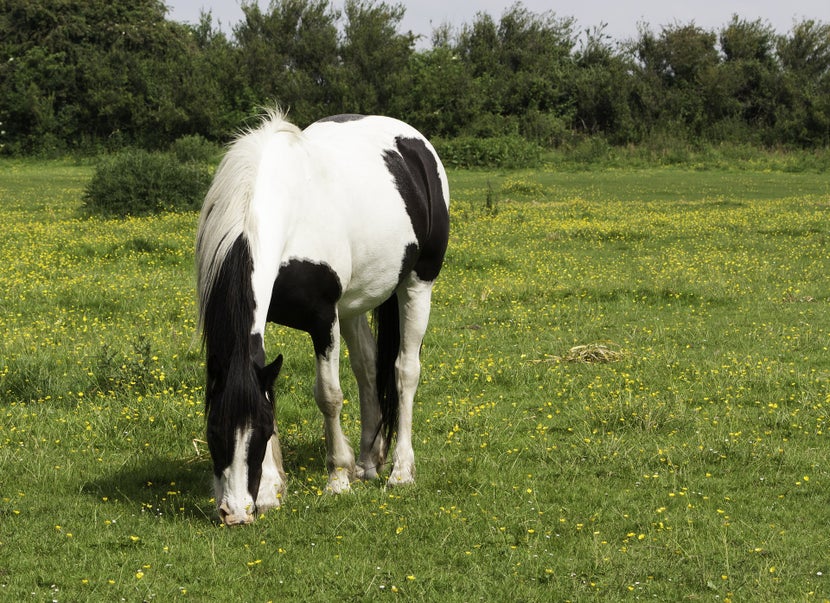The Basics of Horse Deworming

While worms are an unpleasant thought, as horse owners we know that it's important to keep these pesky internal parasites in check. Parasites can plague any horse, anywhere in the world. Even the cleanest of properties can see parasite traffic, so it's important to have your horse on a regular deworming cycle. However, the type of cycle you choose is decided by several factors, and horses in different areas and barnyards will require different regimens. Read on below to discover how horses get worms, signs and symptoms, common types of worms, and how dewormers can treat infections.
How Horses Get Worms
Horses most often get worms from grazing in a contaminated environment. Contaminated is not necessarily synonymous with dirty or poorly kept. Other visiting wildlife can introduce a parasite into your horse's environment. Once ingested, worms can grow and reproduce in the digestive tract. Eggs or larvae are then shed in the manure, reintroducing them back into the environment to continue the cycle. Managing manure throughout the barn area and pasture can reduce your horse's risk of exposure. Especially in smaller stable setups, going over paddocks with an arena drag on a surface setting can help break manure down, therefore reducing a horse's exposure. Keeping every horse on the property regularly dewormed is the most significant factor in reducing risk. If every horse is dewormed, then they are less likely to pass them back and forth.
Signs and Symptoms
While a light worm load is normal and usually does not present any problems, worms that go untreated can cause a variety of health issues. Since worms primarily affect the GI tract, common symptoms include weight loss, loose stools, reduced appetite, and colic. Other things to look out for are a dull or rough coat, skin problems, slow growth in younger horses, and poor performance and recovery. One of the earliest signs of possible parasite problems is tail scratching. This can sometimes be caused by a dirty sheath or udder, but if those are clean and they are still rubbing, it's time to consider deworming. In very severe cases, worms can even cause damage to the horse's internal organs and become fatal.
If you're concerned your horse may have worms, your veterinarian can perform a fecal exam to identify how many and what type they have and develop an appropriate treatment regimen.
Types of Worms
| Parasite Name | Scientific Name | Symptoms | Clinical Risks | Affected Horses |
| Ascarids or Roundworms | Parascaris equorum |
|
|
Most prevalent in foals and horses under 2 |
| Large Strongyles |
|
|
|
Most common in horses under 3 |
| Small Strongyles | Cyathostomins ssp. |
|
|
Those in mild temperature climates |
| Pinworms | Oxyuris equi |
|
|
All ages |
| Tapeworms | Anoplocephala perfoliata |
|
|
All ages |
| Bot Flies | Gasterophilus |
|
|
All ages in summertime |
Dewormers: Types, Ingredients, and Usage

Dewormers are available in paste and feed-through forms. Pastes are used to purge worms from the GI tract once they are established and are used weeks or months apart. On the other hand, feed-through products are usually fed daily as a preventative. Depending on the active ingredient, dewormers will target different parasites. There are four classes of ingredients used for deworming horses:
- Macrocyclic Lactones (Ivermectin and Moxidectin): These treat the broadest amount of worms including strongyles, pinworms, ascarids, and bots.
- Benzimidazoles (Fenbendazole and Oxibendazole): These treat strongyles, ascarids, and pinworms.
- Tetrahydropyrimidines (Pyrantel Pamoate and Pyrantel Tartrate): These also treat strongyles, ascarids, and pinworms. Pyrantel Pamoate is used in paste dewormers while Pyrantel Tartrate is used in daily feed-through products.
- Praziquantel: This is an ingredient that does not fall into the other three groups. It is usually included alongside other ingredients like Ivermectin to treat tapeworms.
It is recommended to have your vet do a fecal exam annually. Many horse owners do this at the same time as their Coggins test to maintain a consistent schedule. Having an annual fecal test done ensures that you can put your horse on the appropriate deworming rotation. They will either be a low, moderate, or high shedder. The level determines which wormers they need and when they need them. For foals or pregnant mares, consult your vet, as their deworming program will differ from an adult horse.
| Shedder Level (Eggs per Gram) | Spring (March) | Summer (June) | Late Summer (July) | Early Fall (September) | Fall (October) | Late Fall (November) |
|
Low (<200 epg) |
Ivermectin or Moxidectin | N/A | N/A | N/A | Ivermectin w/Praziquantel or Moxidectin w/Praziquantel | N/A |
| Moderate (200-500 epg) |
Ivermectin or Moxidectin or double dose Fenbendazole |
N/A | Ivermectin or Fendendazole | N/A | Ivermectin w/Praziquantel or Moxidectin w/Praziquantel | N/A |
| High (>500 epg) | Ivermectin or Moxidectin or double dose Fenbendazole | Pyrantel Pamoate or Fenbendazole or Oxibendazole | N/A | Ivermectin w/Praziquantel or Moxidectin w/Praziquantel | N/A | Pyrantel Pamoate or Fendendazole or Oxibendazole |
Closing Thoughts

Deworming your horse regularly is pivotal to a long healthy life. Parasites can strike in any barn, whether there are horses that travel throughout the year or the barn stays more isolated. Other wildlife can introduce harmful parasites to your horse's environment, so all horse owners need to stay on top of their deworming regimen. Figuring out the right regimen can feel overwhelming, that is why we always recommend talking with your vet and having annual fecal exams performed. That way you can deworm with confidence and keep your horse happy and healthy for years to come!
If you have any further questions about dewormers, please contact us at info@ridingwarehouse.com or at 1-800-620-9145. Happy riding!


















